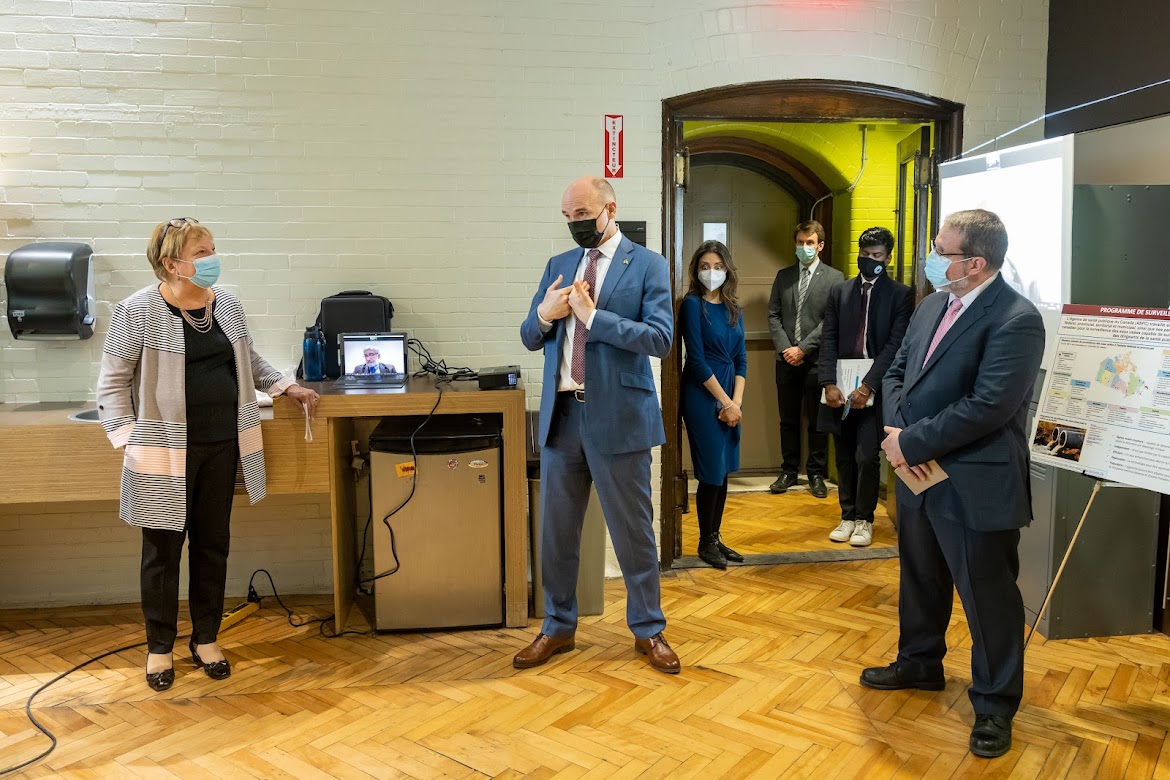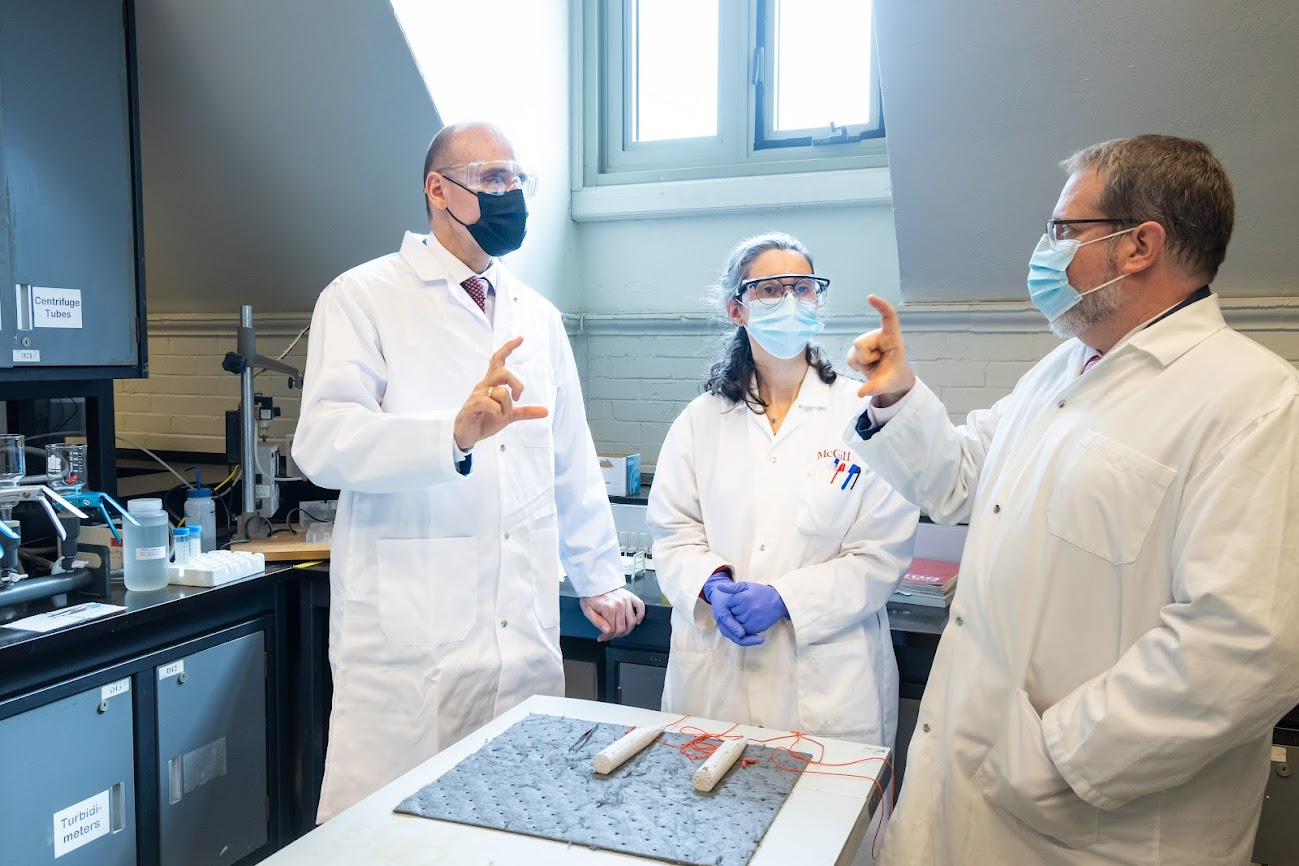
Since the start of the pandemic, a lab on the fifth floor of the McGill’s McConnell Engineering Building has been testing sewage water for traces of the coronavirus. A typical wastewater sample can detect between 1 and 30 infected individuals – including asymptomatic ones – per 100,000 people. In addition, the wastewater test can be done for a fraction of the cost of individual testing: a wastewater test for 100,000 people costs about $500, while a single PCR test costs $50.
The project is co-led by McGill civil engineering professor Dominic Frigon, along with and Peter Vanrolleghem from Laval University, building on their CentrEAU-COVID, a pilot project that monitored the spread of COVID in large urban areas of Quebec.
For the next year, the Quebec government will use the laboratory to perform widespread testing of wastewater to track the spread and concentration of COVID-19 in Montreal, Laval, Quebec City and the Outaouais region.
Researchers mobilized early
When COVID-19 began spreading in early 2020, Frigon, and other wastewater researchers around the world, quickly seized upon the fact that the virus doesn’t only grow in the respiratory tracts of humans, but also in their intestinal tracts – and a patient can shed high concentrations of the virus in their urine and feces.
“That’s why you have some of the COVID-related symptoms that are related to intestinal problems,” Frigon said. “So we realized that using wastewater, we can get at a rapid snapshot of what is happening in the population in terms of viral circulation.”
The operation initially received funding from McGill’s Interdisciplinary Initiative in Infection and Immunity (MI4). By the fall of 2020, Frigon’s lab received $1 million from the Fonds de recherche du Québec – Nature et technologie (FRQNT), a para-governmental agency which provides funding for scientific research projects. They also lined up another $700,000 from two family foundations, the Trottier and Molson Foundations. CentrEAU-COVID launched its website at the end of 2020, using a colour-coded map to indicate the level of viral concentration one of four Quebec regions – Montreal, Laval, Quebec City, and the Lower St. Lawrence.
After the funding ran out in November 2021, the website was put on pause, but Frigon’s lab continued testing in McGill’s student residences. In the winter of 2022, the testing done at residences helped the administration get a better sense of the trajectory of the Omicron variant, and helped the University make adjustments to its COVID-19 strategy on campus.
Omicron, journalists change the game
When the Omicron variant began making its presence felt in December 2021, the demand for PCR tests overwhelmed testing centres. Daily case counts, long considered the benchmark for tracking the severity of the pandemic, shot to unprecedented levels, dwarfing earlier waves of the pandemic. Faced with the increased demand for testing, the Health Ministry decided that PCR tests would only be made available to priority populations, and not the general public. This move, however, meant that the daily case numbers would no longer be a truly reliable indicator of the reach of the virus.
By then, journalists had started calling for wastewater testing for COVID-19 to become the new norm.
“It was a case of journalists catching on to something we’ve known all along,” Frigon said. “The journalists were the ones who said, ‘well, you don’t have anymore data. Why not use wastewater?’ And so, it’s more on the political side that the Ministry got hit, and they said, ‘well, maybe we should revise our position. We can’t come up with answers anymore.’”
In March, the Health Ministry and l’Institut national de santé publique du Québec (INSPQ) formally entered into a one-year partnership with Frigon’s lab.
Federal minister praises ‘lifesaving work’
On April 25, federal health minister Jean-Yves Duclos visited Frigon’s lab to view the wastewater testing process first-hand.
“Your work is not only important now, but will continue in the short and longer term,” Duclos said following his tour of the lab. “COVID is not over, unfortunately. There’ll almost certainly be other forms of the pandemic to come.”

In a tweet posted later that evening, Duclos went further, praising the work being done at the lab as “lifesaving work.”
Since June 2021, the Public Health Agency of Canada has been working with provincial and municipal governments and academic institutions to establish a pan-Canadian wastewater testing network.
“The Public Health Agency of Canada brought together all of these researchers and created four committees – to talk about sampling and wastewater analysis, variant detection and monitoring, epidemiology and monitoring, and a generic coordination committee,” Frigon says. “Essentially, they’re to generate discussion, to tackle issues that may arise.”
Meanwhile, Frigon’s lab hopes to normalize other uses for wastewater testing.
“For example, I’m working on antimicrobial resistance surveillance,” Frigon said. “We can monitor seasonal flu as well. It could be done to detect other diseases in the population.
“Or, when the next pandemic hits.”
